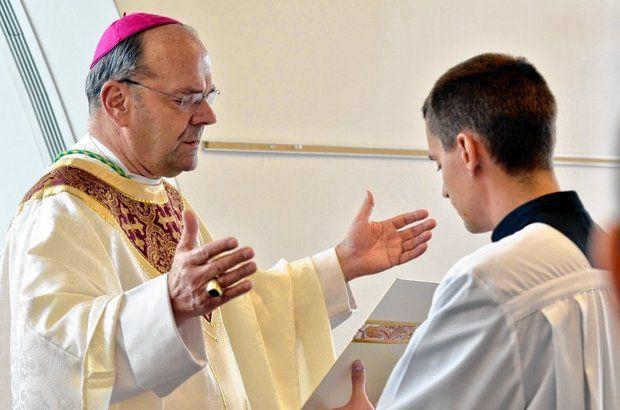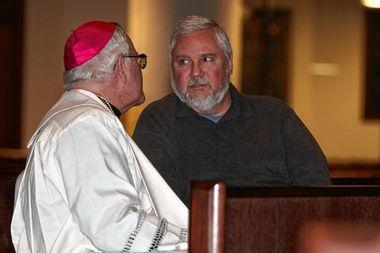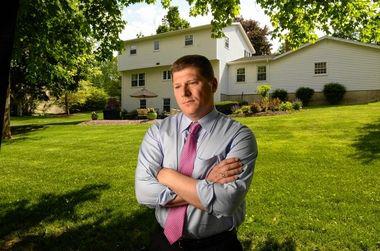|
Child victims partly to blame in priest sex-abuse cases, Syracuse bishop testified
By Bishop Denies That He Is A Bully
[with pdf] SYRACUSE, N.Y. – The victims of child-molesting priests are partly to blame for their own abuse, the bishop of Syracuse said in a sworn deposition that revealed his views on the church's sex abuse scandal. Bishop Robert Cunningham testified in a 2011 deposition in response to a federal lawsuit filed by a man who said a priest in the Syracuse diocese sexually abused him as a child. The man's lawyer asked Cunningham whether, in the eyes of the church, a child molested by a priest has committed a sin. "The boy is culpable," Cunningham said Oct. 14, 2011, according to a transcript of the deposition. His sworn testimony provides rare insight into the thoughts of the highest-ranking Catholic in Syracuse about one of the most troubling chapters in the church's history. Cunningham believes no child is responsible for being sexually abused, a diocese official said this week. It's unfair to use the deposition to characterize his position otherwise, the official said. Bishop tries to explain Later in the deposition, Cunningham backed off the statement somewhat, saying he'd have to know the child's role. "Well, I mean, without knowing the circumstances completely, did the boy encourage, go along with (it) in any way?" Cunningham said. The lawyer asked Cunningham if he could imagine any circumstance in which a 14- or 15-year-old boy could be held responsible in the eyes of the church when a priest asks him to engage in sex. "I would not – obviously, what the priest did was wrong," Cunningham said. "You're asking me if the young man had any culpability, and I can't judge that." Lawyer Raymond Schlather of Ithaca asked: If an abused boy wanted to confess to Cunningham, would he tell the boy he committed no sin?
"I do not know whether I would say that," Cunningham said. The bishop's testimony was startling to a former Catholic priest who has written extensively on sexuality in the church. "That is so absurd," said Richard Sipe of La Jolla, Calif. "It's like saying a child who's beaten is responsible for the beating. It's prehistoric. I can't believe a bishop in (2011) said this." The Catholic Church holds that the age of reason is 7 years old, but that pertains to deciding what between right and wrong, Sipe said. When a priest tells a child that having sex with him is right, the child should not be held responsible, Sipe said. "It's preposterous," said Patrick Wall of Minnesota, a former Catholic priest who's testified as an expert in priest sexual abuse cases over the past 15 years. "There's no way, either in law or in moral theology or in canon law, which Bishop Cunningham is trained in, that a child can consent to that crime." It's highly unusual, but not unheard of, for a bishop to make such a claim, Wall and Sipe said.
"But in 2015, after a couple decades' worth of child sexual abuse litigation, after supposedly having the zero tolerance policy come into effect in the U.S. and for the various popes professing that there's going to be a new way and a new day, this is honestly a huge setback," Wall said. The diocese takes issue with anyone characterizing the 2011 deposition as Cunningham blaming the victim. "Bishop Cunningham firmly believes and states (in the deposition) that the boy is not responsible at any level for that act and the abusive actions of a priest were wrong," diocese spokeswoman Danielle Cummings said. "Depositions by their very nature are meant to be discerning and contentious. Questions are often repeated and wide ranging. One phrase cannot be quoted." Cunningham's remark about culpability was in response to questions about confession, she said. He was "trying to explain that he does not know what is on the minds or hearts of any person." The deposition was taken as part of Dennis Brennan's lawsuit against the Syracuse Diocese. He said he was sexually abused by the Rev. Thomas Neary when Brennan was 13 years old. Brennan sued to try to get the diocese to pay for the cost of undergoing counseling as a result of the abuse. The lawsuit was settled last year, but the terms were not made public. The diocese found credible allegations of child-molesting against Neary, according to court papers. He died in 2001. After abusing Brennan, Neary told the boy he had to confess, according to the deposition.
In his deposition, Cunningham said it was wrong of Neary to take Brennan's confession. Schlather asked why. "Because the priest does not have the ability to absolve an accomplice in a sin such as this," Cunningham said. "I'm saying that a priest does not have the power, the authority, to absolve anyone who cooperated with him in – was an accomplice to him in a sexual sin." Schlather later asked if Cunningham thought Brennan fit the definition of an accomplice, and the bishop backed off his characterization. "How I have trouble answering that is it's very difficult for me to know what was going – what goes on in the mind of a 14- or 15-year-old boy when this is happening," Cunningham said. "The priest is clearly wrong," he said. "I don't know – if what happened happened, then certainly Mr. Brennan has every right to feel abandoned and apart. And, certainly, I don't think there would be culpability, but I mean, I can't make that judgment." Cunningham used the word "accomplice" in explaining why a priest shouldn't take the confession of someone he'd sexually abused, Cummings said. The word's meaning in canon law isn't the same as in criminal or civil law, she said. "The Bishop used this term with his own canonical understanding of the general context and usage of the word, which is 'involved without regard to one's willingness or intent'" Cummings said.
Diocesan official: I'd have objected Schlather read to Wright the portion of Cunningham's deposition where he says the boy is culpable. She said she'd been unaware of it. "It was never conveyed to me, and I certainly would be very vocal in my objections to such a statement," said Wright, a psychiatric social worker with years of experience counseling child-molesting victims. "The only way that a victim answers in the sense of feeling guilty about that is because their physical body responds," Wright testified. "That's not culpability. That's a biological reaction." Survivors of priest sexual abuse want Cunningham to resign partly because of what he said in that 2011 deposition. The survivors seeking Cunningham's resignation include Charles Bailey, who said he was also a child victim of Neary's. About 10 years ago, Bailey asked then-Bishop James Moynihan whether the church held children victims partly responsible for sexual abuse from priests. The bishop said it did, according to Bailey. "Moynihan said that right to my face – 'The age of reason is 7, so if you're at least 7 you're culpable for your actions,' " Bailey said. "That kind of floored me." Moynihan is too ill to be interviewed, Cummings said.
Survivors call for bishop's resignation Along with the 2011 deposition, they'll also cite Cunningham's refusal to publicly release the names of the priests against whom the diocese has found credible allegations of child-molesting. About 30 Catholic dioceses across the country publish the names of priests with credible allegations of child-molesting. The Rochester diocese is among them. The survivors will also cite what they say is evidence that priests from other dioceses with child-molesting allegations against them have been shipped to a retirement home for priests in Syracuse. The diocese denied stashing priests from other areas. "The Diocese is only responsible for the priests of the Diocese of Syracuse and those who have permission to serve in this diocese having proof of being in good standing," Cummings said. "If there is a priest from another diocese with a credible allegation and with faculties removed who is living in Syracuse, the Diocese of Syracuse has no authority over that priest." Cunningham's deposition might be the most troubling of the survivors' concerns, they said.
"It's disgusting," Braney said. "It implies the boy has power in that relationship."
"It's almost worse than the abuse itself," he said of the idea that the victim is partly to blame. David Clohessy, director of the Survivors Network of those Abused by Priests, said there's nothing in the Catholic Church's teaching that supports Cunningham's testimony. "Blaming a victim of childhood sexual violence for his or her trauma is among the most inhumane things I can imagine a person saying, especially a well-educated man like a bishop," Clohessy said. "It's important to remember that a deposition remarks are the opposite of off-handed remarks. Cunningham chose his words carefully. That makes his callousness even more alarming." The survivors have been working with two lawyers nationally known for filing legal cases on behalf of victims of child-molesting. Jonathan Little of Indianapolis and Robert Allard of San Francisco have been advising Braney and helping him find a way to challenge the diocese. The survivors will push for the passage of a state law that would allow claims of child-molesting from years ago to be prosecuted criminally and civilly. Those claims are now beyond the statute of limitations. Braney, Bailey and two other victims of child-molesting priests plan to hold a "community meeting" at 7 p.m. Monday at the Craftsman Inn in Fayetteville to start the petition. "He's probably a wonderful man who's given much to the church and the Syracuse community, but he's not fit to lead," said Braney, of Denver. Braney said he was sexually abused more than a dozen times in the early 1980s by Monsignor Charles Eckermann. The diocese found Braney's accusations to be credible and defrocked Eckermann last year. Contact: jobrien@syracuse.com
|
.
Any original material on these pages is copyright © BishopAccountability.org 2004. Reproduce freely with attribution.


